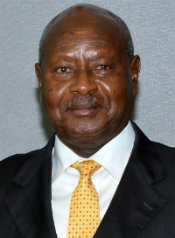Summary | Excerpt | Reviews | Beyond the Book | Read-Alikes | Genres & Themes | Author Bio

This article relates to Kintu
Kintu is set in Uganda, a landlocked country in central Africa bordered by South Sudan, Kenya, Tanzania, Rwanda and The Democratic Republic of Congo. It is home to approximately 39 million individuals (2015).

Human activity in the region that is now Uganda dates back at least 50,000 years as evidenced by stone tools found in the area. Around 2000 years ago, it is thought that Bantu-speaking people started to settle the area bringing with them simple agriculture and use of metal tools. Etymologically speaking, Bantu simply means "people." The Bantu peoples most likely migrated from near modern-day Nigeria around 3,000 years ago eventually spreading across most of sub-Saharan Africa. Today there are over 300 ethnic groups in Africa who speak variations of Bantu.
In the 17th and 18th centuries the area was dominated by several clans, notably the Buganda, Bunyoro, Busago, Ankole and Toro. These families worked with Sudanese slave traders to enhance their wealth and prey upon their rival clans; the Buganda ultimately achieved supremacy and dominated the economy until the arrival of European colonizers in the late 19th century. In 1888 the Imperial British East Africa Company established a presence in the Buganda territorial province (with the permission of the local rulers) and in 1894 it was declared a British Protectorate. Control was soon expanded to lands belonging to other tribes. Although the British established a cotton export business in Uganda in the early 20th century, the territory was never officially declared a British colony.
A gradual transfer of power to native governance began in 1921 with the establishment of local legislative and executive councils. European influence continued until 1962, when Uganda became fully independent and was deemed to be self-governing. In a general election that year, Milton Obote became the country's first prime minister. Obote repealed the constitution in 1966 and declared himself the head of state, establishing a dictatorship initially backed by the country's military.
This state of affairs lasted until 1971, when a former paratrooper sergeant, Idi Amin Dada, staged an armed military coup to overthrow Obote. Although Amin was very popular at first, his government quickly devolved into authoritarianism. Uganda's Asian citizens were expelled and their property seized, Uganda's Jewish community received similar treatment, and intellectuals were demonized (things like books, spectacles and chess sets were publicly destroyed). According to The Commonwealth website, "Public order rapidly deteriorated, and murder, destruction of property, looting and rape became hallmarks of the regime."
 Amin declared himself President for Life in 1978 and invaded Tanzania. Supported by the Uganda National Liberation Front – a group of exiled Ugandans – the Tanzanian army fought back and invaded Uganda, capturing its capital Kampala in April 1979. Obote was re-established as President of Uganda, but this did nothing to stem the ongoing atrocities committed by the nation's army.
Amin declared himself President for Life in 1978 and invaded Tanzania. Supported by the Uganda National Liberation Front – a group of exiled Ugandans – the Tanzanian army fought back and invaded Uganda, capturing its capital Kampala in April 1979. Obote was re-established as President of Uganda, but this did nothing to stem the ongoing atrocities committed by the nation's army.
In 1982, Yoweri Museveni formed the National Resistance Army (NRA) made up primarily of orphans and other victims of the Amin/Obote regimes. His soldiers entered Kampala in 1986 at which point he inherited a country in which the years of conflict had resulted in approximately one million deaths, two million refugees, and the ruin of the country's economy and infrastructure. He appointed a government that, for the first time, crossed ethnic lines, and re-established the rule of law. He also set up a Human Rights Commission to investigate war crimes, and his government encouraged foreign investment and tourism to help grow the Ugandan economy. Free elections were held in 1996 and Museveni was elected president with 75% of the vote. Although the country has experienced relative stability and economic growth since, his term in office hasn't been free from controversy. He has involved Uganda in conflicts including the civil war in The Democratic Republic of Congo and other regional clashes. In addition, his regime has suppressed political dissent, and he instituted a change to the constitution eliminating term limits thereby allowing himself to stay in office indefinitely; he won his fifth term of office in 2016.
Uganda map from Lower Park School
Picture of Yoweri Museveni from U.S. Department of State
Filed under Places, Cultures & Identities
![]() This article relates to Kintu.
It first ran in the June 21, 2017
issue of BookBrowse Recommends.
This article relates to Kintu.
It first ran in the June 21, 2017
issue of BookBrowse Recommends.
Your guide toexceptional books
BookBrowse seeks out and recommends the best in contemporary fiction and nonfiction—books that not only engage and entertain but also deepen our understanding of ourselves and the world around us.